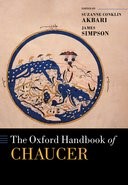 The Oxford Handbook of Chaucer
The Oxford Handbook of Chaucer
Contents
-
-
-
-
-
-
-
-
-
-
-
-
-
-
-
-
-
-
-
The river of time The river of time
-
Language and nation Language and nation
-
Notes Notes
-
Bibliography Bibliography
-
-
-
-
-
-
-
-
-
-
20 Historiography: Nicholas Trevet’s Transnational History
Get accessSuzanne Conklin Akbari is Professor of Medieval Studies at the Institute for Advanced Study and was educated at Johns Hopkins and Columbia. She has written books on optics and allegory (Seeing Through the Veil, University of Toronto Press, 2004) and European views of Islam and the Orient (Idols in the East, Cornell Universit Press, 2009), and edited collections on travel literature (Marco Polo, University of Toronto Press, 2008), Mediterranean Studies (A Sea of Languages, University of Toronto Press, 2013), and somatic histories (The Ends of the Body, University of Toronto Press, 2013). She is completing a monograph titled Small Change: Metaphor and Metamorphosis in Chaucer and Christine de Pizan and working on a project on premodern ideas of periodization as seen in universal histories, maps, and diagrams.
-
Published:02 September 2020
Cite
Abstract
This chapter addresses Chaucer’s chief model for the writing of universal history: the early fourteenth-century Anglo-Norman chronicle of Nicholas Trevet. The first section sketches out the overall nature of Trevet’s world history, indicating its scope and showing what view it presents of English national identity, especially in terms of genealogical descent and territorial claims. It then turns to the Constance narrative that provided a model for the Man of Law’s Tale, illustrating how Trevet’s version highlights the role of language in the establishment of national identity, and in the mediating of fundamental changes in that national identity. Selected other passages in Trevet’s work also illustrate the role of language in articulating the boundaries that separate nations and, sometimes, bring them together. The chapter closes by identifying what it is that Trevet’s historical vision offers readers of Chaucer’s histories, such as Troilus or the Knight’s Tale: namely, a capacious temporal scope that makes room for a plural vision of multiple historical contexts—biblical, apostolic, Trojan, Roman, Theban, British, Saxon, and English.
Sign in
Personal account
- Sign in with email/username & password
- Get email alerts
- Save searches
- Purchase content
- Activate your purchase/trial code
- Add your ORCID iD
Purchase
Our books are available by subscription or purchase to libraries and institutions.
Purchasing information| Month: | Total Views: |
|---|---|
| October 2022 | 7 |
| November 2022 | 1 |
| December 2022 | 2 |
| January 2023 | 4 |
| February 2023 | 3 |
| March 2023 | 4 |
| April 2023 | 3 |
| August 2023 | 1 |
| September 2023 | 2 |
| November 2023 | 1 |
| March 2024 | 3 |
| April 2024 | 2 |
| May 2024 | 1 |
| June 2024 | 3 |
| July 2024 | 5 |
| October 2024 | 2 |
| November 2024 | 3 |
| December 2024 | 2 |
| January 2025 | 2 |
| February 2025 | 2 |
| April 2025 | 3 |

Get help with access
Institutional access
Access to content on Oxford Academic is often provided through institutional subscriptions and purchases. If you are a member of an institution with an active account, you may be able to access content in one of the following ways:
IP based access
Typically, access is provided across an institutional network to a range of IP addresses. This authentication occurs automatically, and it is not possible to sign out of an IP authenticated account.
Sign in through your institution
Choose this option to get remote access when outside your institution. Shibboleth/Open Athens technology is used to provide single sign-on between your institution’s website and Oxford Academic.
If your institution is not listed or you cannot sign in to your institution’s website, please contact your librarian or administrator.
Sign in with a library card
Enter your library card number to sign in. If you cannot sign in, please contact your librarian.
Society Members
Society member access to a journal is achieved in one of the following ways:
Sign in through society site
Many societies offer single sign-on between the society website and Oxford Academic. If you see ‘Sign in through society site’ in the sign in pane within a journal:
If you do not have a society account or have forgotten your username or password, please contact your society.
Sign in using a personal account
Some societies use Oxford Academic personal accounts to provide access to their members. See below.
Personal account
A personal account can be used to get email alerts, save searches, purchase content, and activate subscriptions.
Some societies use Oxford Academic personal accounts to provide access to their members.
Viewing your signed in accounts
Click the account icon in the top right to:
Signed in but can't access content
Oxford Academic is home to a wide variety of products. The institutional subscription may not cover the content that you are trying to access. If you believe you should have access to that content, please contact your librarian.
Institutional account management
For librarians and administrators, your personal account also provides access to institutional account management. Here you will find options to view and activate subscriptions, manage institutional settings and access options, access usage statistics, and more.